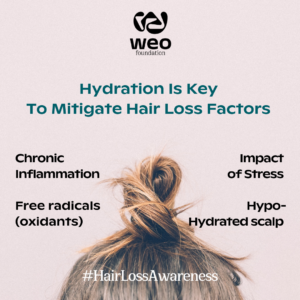Millions of people across the globe struggle with hair loss, causing both physical and emotional stress to the people it affects. Every August we recognize the impact of this ubiquitous condition, as it is national hair loss awareness month.
 Although there are many reasons for unavoidable hair loss such as necessary medications, chemotherapy treatments, viral infections, and hormonal imbalances, there are also avoidable or manageable conditions that promote hair loss, which are better in our control. One of the strategies to avoid pathological hair loss includes avoiding long-standing chronic inflammation in the body – this is where the balance between the amount of oxidants (free radicals) and antioxidants is tipped in the favor of not having enough antioxidants in our body to quench free radical damage. Free radicals spare no area of the body when they do harm and that includes our hair follicles. Having enough antioxidants in the body through consumption of healthy food and water, especially electrolyzed water that has been shown to be a potent selective antioxidant, is essential for overall health as well as protecting our hair and its restoration and growth.
Although there are many reasons for unavoidable hair loss such as necessary medications, chemotherapy treatments, viral infections, and hormonal imbalances, there are also avoidable or manageable conditions that promote hair loss, which are better in our control. One of the strategies to avoid pathological hair loss includes avoiding long-standing chronic inflammation in the body – this is where the balance between the amount of oxidants (free radicals) and antioxidants is tipped in the favor of not having enough antioxidants in our body to quench free radical damage. Free radicals spare no area of the body when they do harm and that includes our hair follicles. Having enough antioxidants in the body through consumption of healthy food and water, especially electrolyzed water that has been shown to be a potent selective antioxidant, is essential for overall health as well as protecting our hair and its restoration and growth.
Another strategy to promote good hair health is simply to maintain proper hydration. Studies have shown that a key factor in quality hair health is having adequate water in lower layers of the epidermis to the stratum corneum as well as the trans-epidermal water content. Without sufficient water intake our scalp will not contain the right amount of hydration to keep our hair strong and healthy. Water also helps with other biological processes in the body such as detoxification. When toxins are not able to be excreted by the body because of reasons such as hypohydration, they have been shown to negatively impact hair health.
Lastly, drinking enough water can also help mitigate stress, which is a well-known and accepted etiology for hair loss. Dehydration has been called the number one cause of stress in your body. In fact, it’s a self-perpetuating cycle: dehydration can cause stress, and stress can cause dehydration. When you feel over stressed, your adrenal glands can produce extra cortisol, also known as the body’s main the stress hormone. When the feeling of being over-stress is chronic in nature, your adrenal glands can become fatigued, which can result in lower electrolyte levels. Drinking appropriate amounts water can help reduce the negative psychological and physiological impacts of stress and help your hair health!
The health of our hair can be a reflection of our overall health. Using simple strategies such as getting our recommended 8-10 glasses of water per day can translate into many positive benefits, especially if you are one of the millions that struggle with hair loss. Hydration is something to focus on that may really make a positive impact!
REFERENCES:
- Hong Y, Chen S, Zhang JM. Hydrogen as a selective antioxidant: a review of clinical and experimental studies. J Int Med Res. 2010;38(6):1893-903. doi: 10.1177/147323001003800602. PMID: 21226992.
- Mokrejs P, Hutta M, Pavlackova J, Egner P, Benicek L. The cosmetic and dermatological potential of keratin hydrolysate. J Cosmet Dermatol. 2017 Dec;16(4):e21-e27. doi: 10.1111/jocd.12319. Epub 2017 Feb 6. PMID: 28164425.
- Pierard GE. Toxic effects of metals from the environment on hair growth and structure. J Cutan Pathol. 1979 Aug;6(4):237-42. doi: 10.1111/j.1600-0560.1979.tb01130.x. PMID: 227944.
- Pasch, M.C. (2012). Hair Disorders Induced by External Factors. In: Rustemeyer, T., Elsner, P., John, SM., Maibach, H.I. (eds) Kanerva’s Occupational Dermatology. Springer, Berlin, Heidelberg. https://doi.org/10.1007/978-3-642-02035-3_26
- https://www.webmd.com/diet/features/water-stress-reduction
